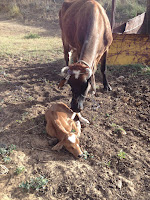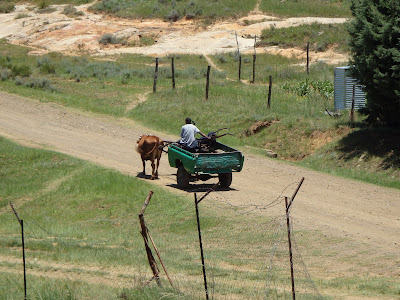 |
| Cows returning from a day of grazing in Lesotho. |
Many cultures like cows. Americans like beef, leather,
cheese, and milk. Hindu cultures consider cows so sacred that they are never
used for these things. They are simply allowed to live and do as they please.
Cows or likhomo
are directly equated with wealth. A family which owns cows and hires someone to
be their molisana or herdboy is
considered to be well off regardless of the size or style of their home or
wardrobe. Cows are the most commonly used denominator for paying lebollo or the bride price. A cow is a
critical part of the Basotho funeral,
as a cow of the same gender must be slaughtered on the morning of the funeral;
the meat serving the funeral attendees that day and the skin used in rituals
completed throughout the ensuing year. Cows make men’s work easier-they are
often used to pull wagons, plows, and trees.
Even the cow’s excrement is a valuable commodity in Lesotho.
Cow patties are often gathered and dried to be used in lieu of firewood for
cooking. The traditional Basotho huts are made of a combination of dirt, cow
dung, and water.
 |
| A traditional rondeval made from cow dung. |
 |
| Cows hanging outside my door after delivering the harvested maize last year. |
Because of the cow’s valuable role in so many aspects of
Basotho culture, many local idioms include cows. Sometimes these seem direct-a
cow is a cow after all-but often the meaning is deeper with the valuable cow
representing a person or people:
Khomo ke molimo o nko
e metsi. A cow can do everything: in Basotho culture, cows do almost
everything. Similarly, people can do most things and should do all the work.
Khomo ke kopanya
liboko. Cows join clans: This one stems from cows being used as the bride
price before a bride moved from her own family and clan into that of her new
husband.
 |
| My supervisor was thrilled to show off this newborn calf. |
Khomo ha e ke e nye
bolokoe ka o fela. The cow doesn’t excrete all: For those that have spent a
lot of time around cows, this is well known. In Sesotho, however, it is often
used at the conclusion of a speech. The phrase implies the speaker is finished
so as to not tell all or say to much.
Likhomo ha li na
motloha pele. Cows don’t have a first: in this case, the idiom is
expressing the idea that while some people or cows might get somewhere or
accomplish something first, it is not a race so people should not compare
themselves to one another.
Lepotlapotla le ja
puli, lesisitheho le ja khomo. Be quick to eat the goat, slow to eat the cow:
cows are more valuable and take more time to grow than goats, so by being
patient and taking the time, people will achieve better and bigger things.
 |
| Cows pulling wagon in Lesotho |
No comments:
Post a Comment